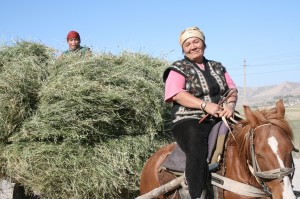 Worldwide, women are considered less-than. Compared to men, we’re less equal, less challenged, less heard, less understood, less represented, less educated, less fed, lead less peaceful lives (see this great article on depression in teen girls), and a whole multitude of other inequalities. Because of systems of brokenness, women are way too often considered less human than men. This isn’t to say that men individually have done anything wrong. Much like the systems that beget and perpetuate racism, systems also prolong sexist attitudes.
Worldwide, women are considered less-than. Compared to men, we’re less equal, less challenged, less heard, less understood, less represented, less educated, less fed, lead less peaceful lives (see this great article on depression in teen girls), and a whole multitude of other inequalities. Because of systems of brokenness, women are way too often considered less human than men. This isn’t to say that men individually have done anything wrong. Much like the systems that beget and perpetuate racism, systems also prolong sexist attitudes.
Patriarchal systems are present in just about every aspect of life. They’re the systems that make it difficult to find a pair of pants considered normal, but with curves in the hips. They’re the systems that makes it seem odd when a movie is more about a woman’s life (outside of the life of the men she’s involved with) than a man’s. They’re the systems that make it ok for men to call women demeaning names or sexually objectify them, causing women to live in fear of men’s presence. They’re the systems that make it ok for a woman to be ostracized in her community because her husband has passed or because she has a disease. Honestly, why does it seem odd when a woman comes up to the pulpit to preach? As more and more people realize the lack of genuine female presence in society, we must look to our Savior to guide us in how to change the systems.
 In his interactions with women, Jesus offered them a wholeness that their society denied them. Similar to today, women in Jesus’ day were considered less-than. They were often objects to be loved in private and pushed to love in silence. Jesus, however, heard the women around him. In the story of the Samaritan Woman at the well (John 4), Jesus heard the woman’s thirsty desire for unending satisfaction. He knew that what she needed wasn’t water, but life itself. The way she was treated because of her ethnicity and multiple husbands sucked dry the very life of her bones. Soon, she knew that true life could only come from the Messiah. Recognizing her desire for acceptance, Jesus offered her the one thing no one was willing to give a Samaritan woman like her: Jesus heard her. His open ears allowed him to hear through the differences in their culture and through the differences in their gender. When she was heard, she knew that this man offered a different way to satisfaction that did not involve the norms of her society. This woman was then able to tell her story to Samaritans around her and lead them to the Messiah. (One of my favorite things about this passage is the disciples are in no way surprised to see Jesus sitting there talking with a Samaritan woman. This leads me to believe that occurrences such as these were not rare.)
In his interactions with women, Jesus offered them a wholeness that their society denied them. Similar to today, women in Jesus’ day were considered less-than. They were often objects to be loved in private and pushed to love in silence. Jesus, however, heard the women around him. In the story of the Samaritan Woman at the well (John 4), Jesus heard the woman’s thirsty desire for unending satisfaction. He knew that what she needed wasn’t water, but life itself. The way she was treated because of her ethnicity and multiple husbands sucked dry the very life of her bones. Soon, she knew that true life could only come from the Messiah. Recognizing her desire for acceptance, Jesus offered her the one thing no one was willing to give a Samaritan woman like her: Jesus heard her. His open ears allowed him to hear through the differences in their culture and through the differences in their gender. When she was heard, she knew that this man offered a different way to satisfaction that did not involve the norms of her society. This woman was then able to tell her story to Samaritans around her and lead them to the Messiah. (One of my favorite things about this passage is the disciples are in no way surprised to see Jesus sitting there talking with a Samaritan woman. This leads me to believe that occurrences such as these were not rare.)
Jesus not only heard women in a culture where they were supposed to be silent, but Jesus truly saw women as well. When Jesus went to eat at the house of a Pharisee (Luke 7), he was anointed with the tears and perfume of a “sinful woman.” The Pharisee was dumbfounded that Jesus would accept such actions from someone so low on the chain of command. Despite the Pharisee’s awe, Jesus made it clear that the woman was lovely enough for him to want to be loved by her. When the Pharisee basically called her unworthy to even be in his home, Jesus essentially said “No, LOOK at her. She’s giving me everything, and I love her. She is worthy in my eyes, even if she’s not in yours.” Jesus saw this woman for who she was, a sinner and a woman, and loved her gesture of gratitude just the same. By seeing and hearing the women around him in a culture that would rather keep women in private, Jesus made it clear that women are a big part of the Kingdom of God. In hearing the woman’s true needs and seeing the woman for who she was, Jesus empowered these women to spread the joy and peace that can only come with the message of the Messiah.
 While women’s empowerment for us here at CWR may look a little different than it did for Jesus, it is still important work. Jesus’ reactions to these women, and the many others that he chose to include in his ministry, makes it clear that today, we must continue to challenge the status quo of our societies by not allowing women to continue to go unseen and unheard. Our partners are working on making these a reality in the lives of many women all around the world. Currently, we have projects in four continents-South America, Africa, Asia, and North America. It’s a big part of who we are and how we see ourselves connected to God’s mission of healing the brokenness of our world. But what do we really mean by women’s empowerment?
While women’s empowerment for us here at CWR may look a little different than it did for Jesus, it is still important work. Jesus’ reactions to these women, and the many others that he chose to include in his ministry, makes it clear that today, we must continue to challenge the status quo of our societies by not allowing women to continue to go unseen and unheard. Our partners are working on making these a reality in the lives of many women all around the world. Currently, we have projects in four continents-South America, Africa, Asia, and North America. It’s a big part of who we are and how we see ourselves connected to God’s mission of healing the brokenness of our world. But what do we really mean by women’s empowerment?
Women’s Empowerment takes multiple forms. In Mexico this looks like micro-finance loans to marginalized families. In South Africa, this means training and payable loans for women so they can start their own businesses. In South Sudan, this means that widows are given opportunities to be heard despite not having husbands. Based on the context of where the work is done, women’s empowerment can change dramatically. Overall, women’s empowerment has to do with giving women choice in their own lives, both inside and outside the home, and giving them the opportunity to define their self-worth for themselves. Women’s empowerment has to do with having the choice available to be the person she wants and needs to be. Around the world, women find the joy that comes from working with our Messiah as they learn they are valued, loved, seen, and heard. Please continue to pray with us for the many women for whom this is not yet a reality.
Written by Kaci Norman, CWR intern


